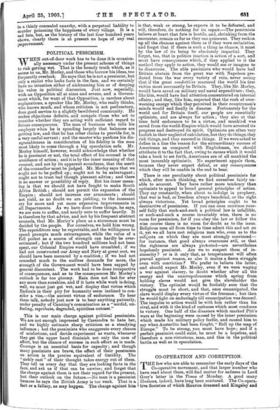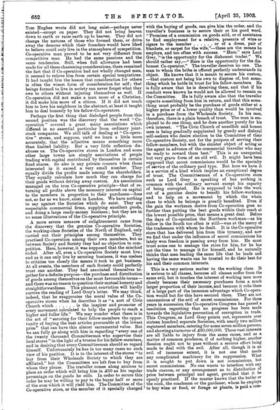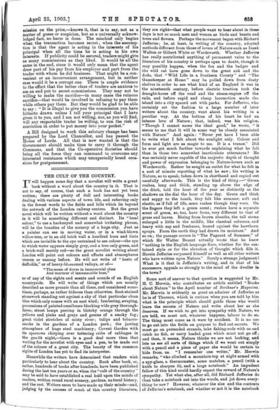CO-OPERATION AND CORRUPTION. T HE few who are able to remember
the early days of the Co-operative movement, and that larger number who have read about them, will find matter for sadness in Lord Grey's letter in the Times of Monday. A good many illusions, indeed, have long been scattered. The Co-opera- tive Societies of which Maurice dreamed and Kingsley and second position was the discovery that the word " Co- therefore, there is a plain breach of trust. The man is em- operation " covered a great many associations which ployed to do one thing, and he does another purely for his differed in no essential particular from ordinary joint- own interest. " The Civic Church of unselfish and honest stock companies. We still talk of dealing at " Co-opera- men is being gradually supplanted by greedy and disloyal tive " stores, and suppose, until we learn a little more self-seekers who desire election to the Committee of their accurately, that the adjective means something more Co-operative Society, not for the purpose of serving their than limited liability. But a very little reflection dis- fellow-members, but with the sinister object of acting as abuses us. The Co-operative stores in London and some the agent in advance of the commercial traveller who may other large towns are simply associations of people be ready to reward them best." This is an unexpected trading with capital contributed by themselves in certain but very grave form of an old evil. It might have been fixed shares. So also is any private concern when those supposed that secret commissions would be the specialty interested in it exceed a very small number. They of service of the ordinary paid type. But here we have it equally divide the profits made among the shareholders. in a service of a kind which implies an exceptional degree They equally calculate how much they can charge for of trust. The Committeeman of a Co-operative store their goods without driving away custom. An association such as Lord Grey is speaking of has nothing in managed on the true Co-operative prinhiple—that of re- common with the ordinary servant except his capacity turning all profits above the necessary interest on capital of being corrupted. He is supposed to take the work to the members in proportion to their purchases—does out of a genuine desire to benefit his fellow-workmen not, so far as we know, exist in London. We have nothing and to help on a movement by which the whole to say against the Societies which do exist. They are class to which he belongs is greatly benefited. Even if respectable commercial firms, supplying excellent goods, the gain the workmen derive from Co-operation goes no and doing a large ready-money business ; but they are in further than putting the best goods within their reach at no sense illustrations of the Co-operative principle. the lowest possible price, that means a great deal. Before measure of enlightenment came from severe A more re the days of Co-operation the Northern workman—as his fellow in the South too often is still—was at the mercy of the discovery that the genuine Co-operative Societies, the working-class Societies of the North of England, only the tradesmen with whom he dealt. It is the Co-operative carried out their principles among themselves. They store that has delivered him from this tyranny, and now practised Co-operation among their own members, but as we find that under the influence of secret commissions his between Society and Society they had no objection to corn- lately won freedom is passing away from him. He must petition. Here, however, it was supposed that the mischief trust some one to manage the store for him, for he has not the time to manage it for himself, and he naturally ended. After all, even a Co-operative Society must live; and as it can only live by securing business, it was useless thinks that men leading the same life that he leads and trusted to do their best for to criticise too closely the means it took to get business. having the same wants can be At all events, the members of each Society could perfectly and their common interests.
trust one another. They had associated themselves to- This is a very serious matter to the working class. It ether for a definite purpose—the purchase and distribution is serious to all classes, because all classes suffer from the of goods among themselves on the most favourable terms— same evil, but it touches the interest of working men more and there was no reason to question their mutual honesty and closely because their necessary purchases form a much straightforwardness. This pleasant conviction will hardly larger proportion of their income, and because it robs them survive the reading of Lord Grey's letter. We may think, of a large part of the immense advantage which Co-opera- indeed, that he exaggerates the moral value of the Co- tion would but for this have secured them. They are not operative stores when he describes it as " a sort of Civic unconscious of the evil of secret commissions. For three Church which is the inspirer and promoter of years in succession the Co-operative Congress has passed a every movement calculated to help the people to reach a resolution regretting that no progress has been made higher and fuller life." We may wonder what there is in towards the legislative prevention of corruption in trade. the act of " securing for their fellow-members the oppor- This Congress, as Lord Grey points out, represents over tunity of buying the best articles procurable at the lowest sixteen hundred separate Societies, with nearly two million price" that can have this almost sacramental value. But registered members, catering for some seven million persons, we can fully go along with him in regarding " every one of and showing a turnover of £80,000,000. These vast interests the twenty thousand Committeemen who supervise their are all liable to injury from the same cause, and as a local stores " in the light of a trustee for his fellow-members, matter of common prudence, if of nothing higher, another and in desiring that every Committeeman should so regard Session ought not to pass without a serious effort being himself. Unfortunately he has in too many cases no such made to deal with the evil. After all, though it is an view of his position. It is to the interest of the stores " to evil of immense extent, it is not one that needs buy from their Wholesale Society to which they are any complicated machinery for its suppression. What affiliated," but the Committees are left free to buy from it is sought to put down is not commissions, but whom they please. The traveller comes along anxious to secret commissions. No one wants to interfere with any place an order which will bring him in £50 as his regular trade custom, or any arrangement as to distribution of percentage on the goods he sells. In order to secure this price between principal and agent, provided that it be order he may be willing to pay to the buyer half or more openly practised. If the master knows that the butler or of the sum which it will yield him. The Committee of the the cook, the coachman or the gardener, whom he employs Co-operative store, or the member of it specially charged to buy wine or food, or forage or plants, is paid a com- Tom Hughes wrote did not long exist—perhaps never with the buying of goods, can give him the order, and the existed—except on paper. They did not bring heaven traveller's business is to secure their or his good word. down to earth or raise earth up to heaven. They did not "Promises of a commission on goods sold, or of assistance change the natures of those who formed them, or drive to find employment for a relative, presents of wine or away the demons which their founders would have liked cigars to the member or of a dress, pair of to believe could only live in the atmosphere of competition. blankets, or carpet for the wife,"—these are the means he Co-operative man proved to be not very different from employs, and too often with success. " Here," says Lord competitive man. He had the same passions and the Grey, " is the opportunity for the dishonest trader." We same tendencies. Still, when full allowance had been should rather say,—" Here is the opportunity for the die- made for all these chastening considerations, there remained honest Co-operator." The traveller deceives no one. The the fact that if Co-operation had not wholly changed man, man to whom the bribe is offered perfectly understands its it seemed to relieve him from certain special temptations. object. He knows that it is meant to secure his custom, It had taught him the lesson that consideration for others —that custom not being his own to dispose of, but some- is often the wisest form of consideration for self ; that thing which he holds in trust for his fellow-members. He beings formed to live in society can never forget what they is fully aware that he is deceiving them, and that if his owe to others without injuring themselves as well. U conduct were known he would not be allowed to remain on Co-operation did not make a man more of a Christian, the Committee. He is fully aware also that the traveller it did make him more of a citizen. If it did not teach expects something from him in return, and that this some- him to love his neighbour in the abstract, at least it taught thing must probably be the purchase of goods either at a him to deal honestly by his fellow-Co-operators. higher price or of a lower quality than would be involved Perhaps the first thing that dislodged people from this in a purchase from the Wholesale Society. In his case, second position was the discovery that the word " Co- therefore, there is a plain breach of trust. The man is em- operation " covered a great many associations which ployed to do one thing, and he does another purely for his differed in no essential particular from ordinary joint- own interest. " The Civic Church of unselfish and honest stock companies. We still talk of dealing at " Co-opera- men is being gradually supplanted by greedy and disloyal tive " stores, and suppose, until we learn a little more self-seekers who desire election to the Committee of their accurately, that the adjective means something more Co-operative Society, not for the purpose of serving their than limited liability. But a very little reflection dis- fellow-members, but with the sinister object of acting as abuses us. The Co-operative stores in London and some the agent in advance of the commercial traveller who may other large towns are simply associations of people be ready to reward them best." This is an unexpected trading with capital contributed by themselves in certain but very grave form of an old evil. It might have been fixed shares. So also is any private concern when those supposed that secret commissions would be the specialty interested in it exceed a very small number. They of service of the ordinary paid type. But here we have it equally divide the profits made among the shareholders. in a service of a kind which implies an exceptional degree They equally calculate how much they can charge for of trust. The Committeeman of a Co-operative store their goods without driving away custom. An association such as Lord Grey is speaking of has nothing in managed on the true Co-operative prinhiple—that of re- common with the ordinary servant except his capacity turning all profits above the necessary interest on capital of being corrupted. He is supposed to take the work to the members in proportion to their purchases—does out of a genuine desire to benefit his fellow-workmen not, so far as we know, exist in London. We have nothing and to help on a movement by which the whole to say against the Societies which do exist. They are class to which he belongs is greatly benefited. Even if respectable commercial firms, supplying excellent goods, the gain the workmen derive from Co-operation goes no and doing a large ready-money business ; but they are in further than putting the best goods within their reach at his mission on the price,—knows it, that is to say, not as 'a matter of guess or suspicion, but as a universally acknow- ledged fact, no harm is done. The mischief only begins when the transaction becomes secret ; when the assump- tion is that the agent is acting in the interests of his principal when all the time he is acting in his own interests. If publicity could be secured, traders might give as many commissions as they liked. It would be all the same in the end, since it would only mean that the agent drew part of his pay from his employer and part from the trader with whom he did business. That might be a con- venient or an inconvenient arrangement, but in neither case would it be a corrupt one. There is ample evidence to the effect that the better class of traders are anxious to see an end put to secret commissions. They may not be willing to make the sacrifice—in many cases the ruinous sacrifice—that would be involved in refusing to pay them while others pay them. But they would be glad to be able to say : " It is illegal to give you the commission you have hitherto drawn unless I tell your principal that I have given it to you, and I am not willing, nor, as you will find, will any respectable trader be willing, to run the risk of conviction in order to put money into your pocket."
A Bill designed to work this salutary change has been prepared by the Lord Chancellor, and has passed the House of Lords. All that is now wanted is that the Government should make time to carry it through the Commons, and that the Co-operative Societies should bring all the force they can command to overcome any interested resistance which may unexpectedly breed occa- sions for postponement.




























































 Previous page
Previous page